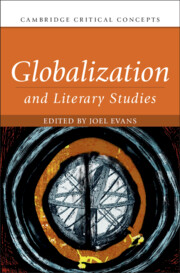Book contents
- Globalization and Literary Studies
- Cambridge Critical Concepts
- Globalization and Literary Studies
- Copyright page
- Contents
- Figures
- Tables
- Contributors
- Acknowledgements
- Introduction
- Part I Origins
- Part II Development
- Part III Application
- Chapter 15 The Globalization of the Enclave
- Chapter 16 Geopolitics and the Novel
- Chapter 17 Spy Fiction in the Age of the Global
- Chapter 18 The Twenty-First-Century Global Slave Narrative Trade
- Chapter 19 Planetary Poetics
- Chapter 20 Addressing Globalization in the Anthropocene
- References
- Index
Chapter 18 - The Twenty-First-Century Global Slave Narrative Trade
from Part III - Application
Published online by Cambridge University Press: 01 April 2022
- Globalization and Literary Studies
- Cambridge Critical Concepts
- Globalization and Literary Studies
- Copyright page
- Contents
- Figures
- Tables
- Contributors
- Acknowledgements
- Introduction
- Part I Origins
- Part II Development
- Part III Application
- Chapter 15 The Globalization of the Enclave
- Chapter 16 Geopolitics and the Novel
- Chapter 17 Spy Fiction in the Age of the Global
- Chapter 18 The Twenty-First-Century Global Slave Narrative Trade
- Chapter 19 Planetary Poetics
- Chapter 20 Addressing Globalization in the Anthropocene
- References
- Index
Summary
A contemporary anti-slavery movement has emerged in response to the diverse array of forms of forced labour that proliferate in the twenty-first-century global economy. The movement has encouraged survivors to speak out about their experiences of enslavement and to work as activists in a new abolitionist cause. As a result, the genre of the slave narrative, so popular among nineteenth-century abolitionists, has reemerged as a form of protest literature. This article suggests that by documenting the very fact of enslavement in the 21st century, the new slave narrators collectively reveal the widespread failure of the promises of globalisation, even as they celebrate their emergence into it. Through these narratives, we are able to discern the true contours of globalisation, the radical inequalities that remain and are fed by the transnational flow of commodities, including but not exclusively labour, and the slavery that is endemic and even encouraged in these global transactions.
- Type
- Chapter
- Information
- Globalization and Literary Studies , pp. 294 - 304Publisher: Cambridge University PressPrint publication year: 2022

